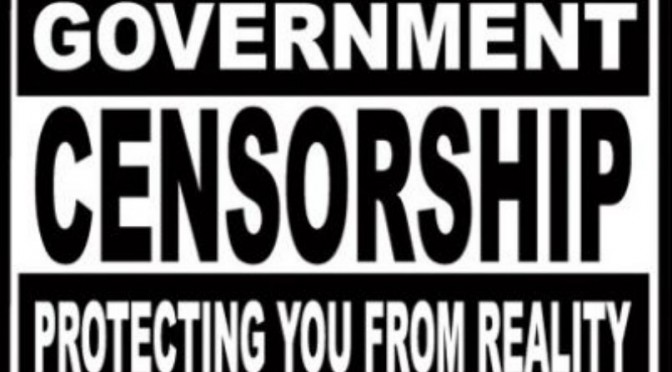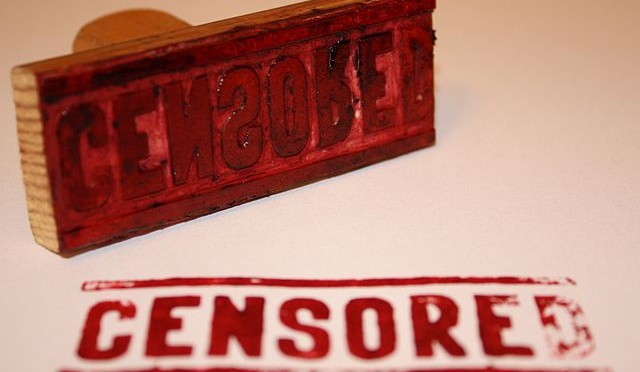– The first condition of progress is the removal of censorship – George Bernard Shaw
– I disapprove of what you say, but I will defend to the death your right to say it – Evelyn Beatrice Hall
In my upcoming book, Porn Panic, I raise a question about the censorship state – specifically the British Board of Film Certification (BBFC), the police and prosecutors – Are They Superhuman? In Britain, all DVD and cinema releases are required, by law, to be certified (and possibly censored) by the BBFC. Obscenity law defines obscene material as that which might “deprave and corrupt” the viewer, listener or reader, and it’s the BBFC’s job to ensure that no such material gets into the public sphere where it might damage our fragile little minds. BBFC examiners watch all submitted material, second-by-second, and recommend cuts if they encounter obscenity. Similarly, police officers who are preparing a case for an obscenity prosecution must sit through hour after hour of depraving and corrupting material. So how is this possible? How can material that depraves and corrupts its audience not deprave and corrupt BBFC examiners, police officers and prosecutors? Are they a different species from us?
I asked the obscenity law specialist, Myles Jackman, for his thoughts on this, and he said: “I’ve have to watch a lot of fairly colourful material in my career, and it doesn’t seem to have had a significant effect on me. Who watches the watchman? Why normal, average members of society are considered to be more sensitive and delicate, I simply can’t answer.”
Censorship is a decision by one group of people to deprive another group of people the right to access some content. At its core, censorship is inherently elitist, and can be nothing else. The censor doesn’t believe that he or she is weak, stupid or brutal enough to be depraved by the material, but believes that other people are. This elitism usually appears in class form, though it can also be linked to sex, sexuality, race or age. Most people don’t think they have the right to censor others, even if they dislike what they watch; but some do. These people, by definition, are elitists.
Elitism rears its head in every single moral panic and act of censorship, without fail. It appears constantly in attempts to censor pornography: “Of course, porn didn’t turn ME into a rapist, but then I’m not one of those people…” It appears among the nice, middle-class ladies of the No More Page 3 campaign, who don’t want to see breasts in a newspaper, and don’t want the Sun’s (mostly working-class) readership to do so either. It appeared in the 1960 Lady Chatterley trial, when the prosecutor asked whether… “you would wish your wife or servants to read”… such books. It appeared during the Video Nasties moral panic, in response to the idea that, thanks to the new VHS technology, ordinary people could now see the kind of uncensored material that had, formerly, only been accessible to the wealthy. It appears now in a new moral panic over computer gaming, in which “the impressionable” are considered at risk of being turned into rapists and murderers.
“The impressionable” are never people like us. They are other. They are poor, or black, or female, or male, or gay, or belong to some other group that we decide to fear or hate. In moral panics, bigotry becomes acceptable – such as this Guardian piece implying that African men don’t have the restraint of white people, and are thus especially prone to being turned into rapists by pornography: “I used to think porn was tremendously good fun… [until in a Ghanaian village, a mud hut is transformed] into an impromptu porn cinema … turning some young men into rapists…” – those primitive Africans, and their rapey ways! And this is in a “liberal” newspaper. As the left has lost touch with its labour roots, it has also become ever more elitist.
Advocates of censorship are certain of their own superiority over those-who-must-be-censored. If they weren’t, it might dawn on them that they don’t have the right to control the behaviour of other people; that they are no better than the people they seek to control. They would instead realise that, while they have the right to boycott material that offends them, the other people also have the right to see it.
Thus, it should come as no surprise that the middle and upper classes, already secure in their innate superiority, are the ones who most seek to censor and control the activities of others. Of course, few people ever admit elitism – they instead try to justify their behaviour with spurious claims of harm: “I’m not a prude, but porn turns men into rapists”, “I’m all for free expression, but computer games make people violent”, “Much as I admire the energy and enthusiasm of youth, heavy metal gives power to Satan”, “I’m not a racist, but hip-hop encourages misogynistic attitudes”… “I’m as reasonable as the next person, BUT THOSE PEOPLE ARE DANGEROUS!”
It is a sign of these conservative times that universities, once bastions of free thought and rebellion against the status quo, have become increasingly censored places. The excuses for campus censorship tend to sound vaguely progressive, but (as the quote at the start of this article makes clear) censorship is anathema to progressives. Conservatism in progressive clothing is the order of the day.
The latest target of campus censorship is a comedian called Dapper Laughs (DL), who has a show on ITV2. I hadn’t heard of him until a week or so ago, when an explosion of outrage erupted on Twitter. Personally, I’m of the opinion that “ITV comedy” is an oxymoron. See – I’m an elitist too!
This latest moral panic began when a Cardiff University student, Vicky Chandler, began a petition to block DL from performing at the university, based on the fact that he’d been recorded telling jokes about rape. No evidence has been presented – it should go without saying by now – that men hear jokes about rape, and then go on to commit rape. The beer sold in the Cardiff student union bar is far more likely to have been involved in sexual assaults than any comedy act. But to call for alcohol to be banned from campus would a truly brave act*, whereas calling for a “sexist” comedian to be banned is guaranteed to win applause and admiration for Chandler from those looking for the next pro-censorship hero.
So the students that might have wanted to see DL, and decide for themselves, are told they’re not allowed to. Because they’re not clever enough to see (alleged) sexism without endangering the female population of Cardiff. Only the elite can decide what is suitable for the entire Cardiff student body to see or hear, and the elite have signed Chandler’s petition. Game over. Predictably, once a few-hundred signatures had been received, the gig was cancelled. Then ITV announced DL would not have another series. But the witch-hunt was just beginning.
The Twitter hysteria followed a pattern which has become tediously familiar: person found guilty of “hate speech” (without the need for a messy trial – who needs due process?); those that question the verdict are accused of supporting hate speech, as are those who defend the right to free speech on principle. Attempts at reasoned discussion are futile (OMG I can’t fucking believe you support violence against women!!!, etc.) Lynch-mobs have no need to hear alternative viewpoints, and the risk of being publicly branded a misogynist is enough of a deterrent for most people to keep quiet.
Supporters of the ban tried to deny this act of censorship was, in fact. censorship, and claimed this had been a democratic process, because everybody had the right to sign the petition, or organise a counter-petition. If this is democracy, it’s an ugly variety – more commonly known as tyranny of the majority. And not even a true majority – just the small number of elitists that decided they should have control over the viewing habits of the quiet majority. This is a fascistic interpretation of democracy, and has chilling implications for all the minorities that might next face censorship-by-petition. As a Jew (we make up 0.3% of the UK population) with mixed-race kids (they constitute 2%), this makes me more than a little uncomfortable. But hey – the elite would never turn on us, would they?
This country, once the birthplace of Enlightenment values, has lost touch with the meaning and purpose of liberal thought. Free speech must, by definition, include bad speech, and (as the old saying goes) the antidote to bad speech is good speech. Allow an elite to deem (without a hint of due process) certain speech to be unacceptable, and freedom is fundamentally lost.
Chandler herself has showed a deep ignorance of liberal values by declaring herself qualified to determine the limits of free speech for everybody. While justifying herself, she tweeted “offending a religion isn’t freedom of speech, it’s hate”. But to offend is a basic right. I find Chandler’s utterances offensive in their dangerous ignorance as to what constitutes free speech, but still, I defend her right to her ignorance, and her right to shout it from the rooftops. All speech that has any value will offend somebody; without the right to offend majority values, the feminist and civil rights movements would have been crushed before they had begun.
But many of today’s “progressives” come from a different school. They use liberal language to cloak the fascistic idea that some viewpoints can be crushed by a small, active group. The censorship of Dapper Laughs is a victory for a censorious elite that is growing in strength by the day.
* For clarity: no, I don’t support bans on alcohol either.
PS: a quick look at Dapper Laughs’ Twitter mentions reveals more people (male and female) regretting the closure of his career than rejoicing in it. But sorry folks, you can’t enjoy your comedy. The elite have spoken.



